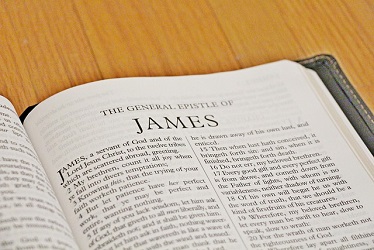*Please take a moment to read the request below my name. Thanks!
Reading Hebrews and James has stirred a question in my mind: What ever happened to the first-century Jewish church? While it is central early in Acts, its place in the biblical story begins to fade by chapter 13 as Luke shifts attention from “Jerusalem, Judea and Samaria” to “the ends of the earth” (Acts 1:8).

We know the Jewish Christian church played a key role in developing doctrine (Acts 15) and that they faced some hardships (consider the gift Paul was collecting). But what happened to the “many thousands” of “zealous-for-the-law” Jews who placed their faith in Jesus and remained in Jerusalem (Acts 21:20)? What role did they play as the number of Gentile believers increased? And how did they respond in A.D. 70, when Rome destroyed the temple?
This is a topic I have never researched or considered before! Perhaps one day I will crack open Josephus and other sources to see what they say. Until then, here are some quick observations about how we can make better sense of a letter written by a key leader in this early Jewish church.
The New Testament identifies five men named James. The most likely author of this letter is the James who was Jesus’ half-brother (they shared the same mother but not the same father). This is probably the James who received a special appearance of the risen Christ (1 Corinthians 15:7) and who very quickly became a key leader in the Jerusalem church (Acts 12:17; Galatians 1:19). Paul puts his name first when identifying the three pillars of the church (Galatians 2:9) which makes sense when we see how, in Acts 15, it is this James who acts as the mouthpiece for the apostolic council.
Think about this for just a moment. Jesus’ brother, James, watched Jesus grow up, was part of the crew that went out to bring the “crazy brother” home (Mark 3:21), and out of unbelief even mocked our Lord’s approach to ministry (John 7:4-5). This same brother is the one who learned to love and follow God’s law from his righteous parents, Joseph and Mary. He is the same one who would have attended Jesus’ last Passover and been a witness to the horrific events that unfolded that week. Did he comfort his mother in her loss? Did he hear his mother say, “Your brother is alive?” And what was Jesus’ reason for singling him out for a personal post-resurrection visit (1 Corinthians 15:7)? What was it that opened the way for James to become the key member of the Jerusalem church and the apostolic council? We may never find answers for these questions until we can ask James personally, but it does make for an intriguing rabbit trail.
James was raised in a culture that was significantly different from our own. So, when reading his letter we must remember to read it through the lens of a Jewish Christian who remains zealous for God’s law. In no way does James contradict Paul’s teaching that we are saved by God’s grace through faith in Christ alone. James teaches the same thing. And, like Paul, he also highlights the Jewish view that true faith is more than intellectual assent; true faith is seen in how one lives.
James places a stronger emphasis on the evidence for true faith than we may be used to. He taught that, while faith alone saves, saving faith is never alone. If one professes faith but has no expression of love then that person’s faith is as limp as a glove without a hand, it is as lifeless as a body without a spirit because “faith without works is dead.” Now, what is it that guides our expression of faith in Christ’s saving work? Is it not the “perfect law that gives freedom” (1:25)?
The author of Hebrews taught that God’s word is living and active. Sharper than any surgeon’s scalpel, God’s word (think law here) is able to penetrate and divide, it judges our thoughts and attitudes (Hebrews 4:12). James picks up on this idea by comparing the law to a mirror. When we look at the law, our response to it shows us what is in our heart (1:22-25).

Are we being conformed into the image of our compassionate Father? When we look into the mirror of God’s word do we see a reflection of His image or do we better reflect someone else? If you have ever “looked intently” (meditated) into God’s law and took the time to apply it to yourself, then you know that this is strong and practical guidance!
As we read James, remember to view what he says through the lens of the “royal law found in Scripture, ‘Love your neighbor as yourself’” (James 2:8). As we do, I think we will see that even twenty-first century Gentile-Christians still have some things to learn from our first-century Jewish-Christian family.
May the Lord’s law guide and His Spirit empower your expression of faith in these interesting days.

Rob
*Please Note:
Our two-year Bible Reading Journey will wrap up on February 28. If you've been reading through the Bible with us, we'd love to hear about your experience and what spiritual benefits you've received. And we want to hear from you even if you haven't kept up with all the reading or are using another reading plan! How has your attempt at reading all the way through the Bible shaped you?
Send Radonna Fiorini a short note about your own reading journey at rfiorini@covenantepc.org. In March we'll celebrate the journey as we hear stories of how God’s word got through to you and encourage each other in our pursuit of knowing God better through His word.






